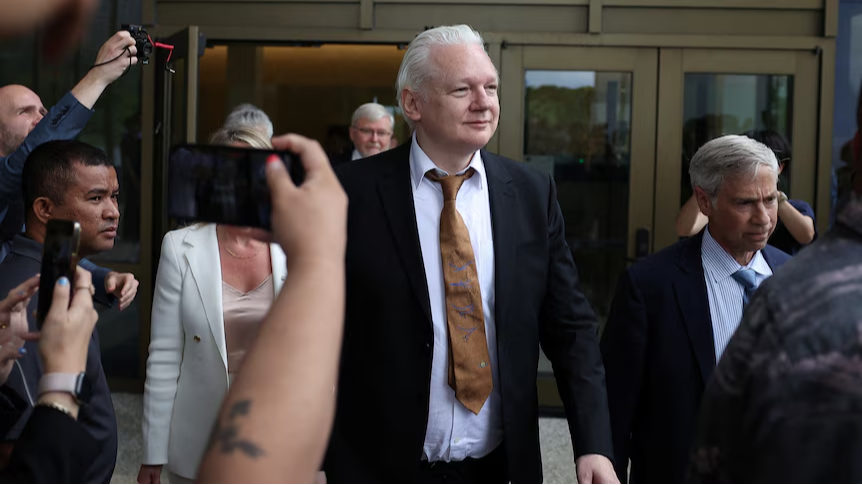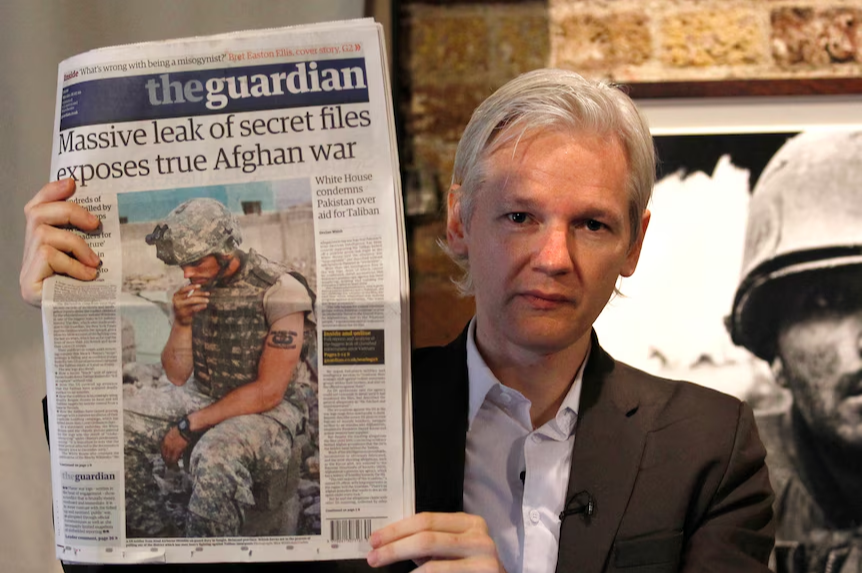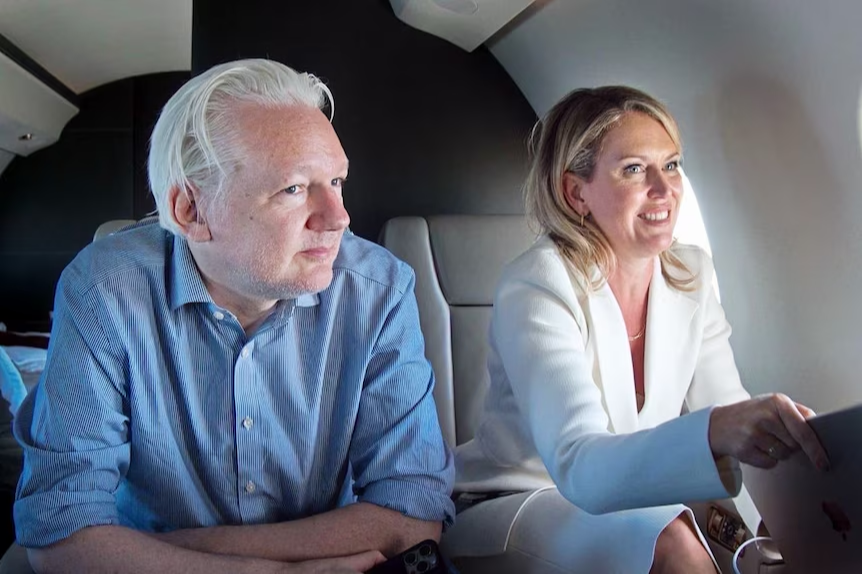
Julian Assange walks out of the United States District Court in Saipan, flanked by his lawyers including Barry Pollack (right). (Reuters: Kim Hong-Ji)
Published on: www.abc.net.au *** By Steve Cannane and Ninah Kopel of ABC Investigations / July 1, 2024
Jet-lagged and a long way from home, US lawyer Barry Pollack found himself inside a packed courtroom for a three-hour hearing on a small island in the Western Pacific last Wednesday.
He'd just flown into Saipan on a private jet with Julian Assange following a frantic final few weeks of negotiations to secure the release of his client from Belmarsh Prison where he had spent over five years fighting extradition to the US.
For Pollack it was an extraordinary end to an ordeal stretching back over a decade.
"The surreal nature of it really sunk in when we were sitting at the airport in London getting onto a private plane to fly to Saipan."
"None of us, when we started this case, thought it was going to end in a courthouse in the Pacific," he told the ABC.
It had been a long journey to that courthouse in Saipan for Barry Pollack.
He had been Julian Assange's US attorney since 2012 — the year the WikiLeaks publisher first entered the Ecuadorian embassy in London and sought asylum.
Prising open the door
Mr Pollack was the key point person who negotiated the plea deal with the US Department of Justice (DOJ), but in the early days, he struggled to get a fair hearing.
"I represented Julian for years before there was any engagement with the Department of Justice," he says.
"Prior to the time that it became public that he had been charged, they were not willing to even confirm whether there was an investigation."
In 2019, Julian Assange's asylum was withdrawn after the political winds shifted and a new president was elected in Ecuador.
He was arrested inside the embassy and eventually sentenced to 50 weeks in custody in Belmarsh for breaching the Bail Act.
Soon after he was indicted under the US Espionage Act for publishing hundreds of thousands of sensitive US military and diplomatic documents, many of which related to the wars in Iraq and Afghanistan.
The US State Department claimed Mr Assange had placed lives at risk by publishing top-secret documents and the DOJ took a hardline on Assange.
"After it became public that he had been charged, their position was, when he gets to the United States and has his initial appearance in the Eastern District of Virginia. We'll talk to you then," Mr Pollack says.
Election results change the game
After Joe Biden was elected in 2020, Mr Pollack saw an opportunity.
"The Biden Department of Justice had issued new guidelines on prosecuting journalists and so I wanted to make a presentation to them on why I thought, under their new policy, the prosecution should not proceed," he says.
The DOJ listened but didn't act. But in 2022 another election result helped change the game.
Mr Assange's legal counsel Jennifer Robinson, who has been on his legal team since 2010, says Prime Minister Albanese has long taken an interest in his case.
"I've been briefing Anthony Albanese since he was minister for Transport more than a decade ago," she says.
"As leader of the opposition, we continued to brief him. This case was important to him. He always said, as leader of the opposition 'enough is enough'. As prime minister, he continued it."
Within days of the Albanese government's election in May 2022, the Foreign Minister Penny Wong raised the case with US Secretary of State Antony Blinken while in Tokyo for the Quad summit.
The following month the prime minister spoke about Mr Assange's case for the first time with President Biden at the NATO conference in Madrid.
"He assured me he was raising it at the highest level. He told the Australian public he was doing it, and he was doing it," says Ms Robinson.
But progress behind the scenes in that first year was slow. Mr Pollack says one of the hurdles was that the DOJ under the Biden administration was keen to show its independence regardless of who was in the White House.
"I think part of the reason that nothing got accomplished during that period [is that] both the Biden White House and the Garland (Attorney-General Merrick Garland) Department of Justice were very anxious to send out the message that this was not the Trump administration, and that the Department of Justice was not a political arm of the White House, and it was going to operate independently and professionally," he says.
Just over a year after he was elected, Mr Albanese attended the coronation of King Charles. In London he made his strongest comments to that point about the failure to find a diplomatic solution to the matter during an interview with the ABC.
"I know it's frustrating. I share the frustration. I can't do more than make very clear what my position is," he said.
"And the US administration is certainly very aware of what the Australian government's position is."
It wasn't known publicly at the time, but behind the scenes there was movement. The prime minister had given Mr Assange's legal team an important steer that things might be shifting in Washington.
"The prime minister told me that he believed that a deal could be done in terms of a plea deal," Ms Robinson says.
"But that negotiation had to happen with us as his legal team, and the US lawyers, so the prosecutors and my US co-counsel Barry Pollack."
Enter Kevin Rudd
Kevin Rudd took up his position as Australia's new ambassador in Washington in March last year. One of his first orders of business was to deal with the Assange case.
Mr Rudd was already very familiar with Mr Assange's plight. When he was foreign minister back in 2010, WikiLeaks released around 250,000 US diplomatic cables.
Some were embarrassing to Mr Rudd, with one batch of summaries sent from the US embassy in Canberra describing him as a "control freak" and a "micro-manager" during his time as prime minister.
But at the time, Mr Rudd pointed the finger at the US for the publication of the secret documents, not Mr Assange.
"Mr Assange is not himself responsible for the unauthorised release of 250,000 documents from the US diplomatic communications network," Mr Rudd said.
"The Americans are responsible for that. I think there are real questions to be asked about the adequacy of their security systems and the level of access that people have had to that material over a long period of time."
Thirteen years later he was about to become a key conduit in preventing Mr Assange from being extradited to the US and tried under the Espionage Act.
"[He was] absolutely, crucial. Kevin was very invested in this," Mr Pollack says.
After her conversation with the prime minister about a possible plea deal Ms Robinson flew to the US to meet with Mr Rudd.
"We briefed Ambassador Rudd about the case and talked about what this was going to take," she says.
"In terms of the role he played in Washington, he effectively played a mediator role. He spoke to the DOJ, he spoke to other US government departments, making very clear that this was a priority of the prime minister and of the government of Australia that this case be resolved."
Mr Pollack, who had struggled to get a hearing from the DOJ initially, was suddenly able to enter meaningful talks about his client.
"[Rudd] worked very doggedly, with both the Department of Justice and me trying to nudge each party to get to a resolution that was acceptable to both of us," he says.
"When you have a complex negotiation like that, having a third party almost serving as a mediator to try to bring the two sides together is enormously helpful. And Kevin played that role."
Mr Assange and his legal team had a number of key red lines when it came to negotiations – he didn't want to serve any more time in prison, he did not want to enter a plea on US soil, he did not want restrictions on his free speech and no further prosecutions over what he had sourced and published.
But despite the intervention of Ambassador Rudd, the negotiations soon ground to a halt.
"We worked on a deal for months that involved a series of misdemeanours … about mishandling classified information that would have allowed us and him to enter that plea remotely, and come home to Australia," Ms Robinson says.
"The DOJ then went quiet on that, and we heard nothing for months on end."
As talks went silent in Washington, things started to escalate in Canberra.
A cross-party delegation involving Greens senators David Shoebridge and Peter Whish-Wilson, former deputy prime minister Barnaby Joyce, independent MP Monique Ryan, Labor MP Tony Zappia, and Liberal senator Alex Antic travelled to Washington to meet with the DOJ and congressmen and women who could influence the debate.
Dr Ryan felt the trip helped convince those that mattered in the US capital that the Australian people and a wide cross section of the parliament wanted the case to end.
"You never know exactly how things have gone. But I do think that the delegation, as a whole made a difference," she said.
To further reinforce the widespread support inside the Australian parliament, Independent MP Andrew Wilkie moved a motion in the House of Representatives urging the US and the UK to end the prosecution of Mr Assange and allow him to return to Australia. It passed with a two-thirds majority.
Mr Pollack says the cross-party delegation and political agitation from inside Australia was critical in getting the DOJ to re-engage.
"I think they made a difference. I think, the bipartisan support in Australia made a difference, and I think Prime Minister Albanese speaking out, made a difference."
The other key factor emerging was that after years of fighting legal cases through the UK courts, Julian Assange's battle to prevent his extradition to the US was coming to a head.
Last roll of the dice
In two days of hearings in London in February this year, Julian Assange sought leave to appeal to the High Court.
It was seen as his last roll of the dice.
What much of the media missed at the time was it was also the US's last chance to get the man they had been pursuing for years.
Internal DOJ emails published by the Washington Post last week show that US lawyers were feeling the pressure.
"The urgency here now has reached a critical point," one of their trial attorneys wrote in an email.
"The case will head to appeal and we will lose."
The lawyers knew the US couldn't guarantee Mr Assange free speech protections under the first amendment, an assurance the UK judges were asking for as part of his appeal.
"I think they were under pressure on two fronts," Ms Robinson says.
"First, there was a very real chance that we were going to win the extradition case on this first amendment ground because, in our view, the US could not provide a satisfactory assurance about protection under the First Amendment."
"But the other point that people miss too, is that the US was, I think concerned about him being extradited and having a very public Espionage Act prosecution of a journalist in an election year."
Adding to the pressure on that front was the fact that American journalist Evan Gershkovich had been locked up in a Russian prison, at that point for close to a year, in pre-trial detention where he was facing what the US considered to be trumped up charges of espionage.
Ms Robinson believes this played into a renewed push for a plea deal.
"Other governments were starting to do what the US was doing, which was using espionage legislation to prosecute journalists," she says.
"You have a US journalist in prison in Russia, Evan Gershkovich. And the US is trying to negotiate his release, and what is the first thing the Russian government is going to say to them? Look at what you're doing to Julian Assange."
Ms Robinson says in the lead-up to the court hearings in London she called the Attorney-General Mark Dreyfus and briefed him about the weaknesses in the US case.
"After my conversations … [Mark Dreyfus] went and met the Attorney General Merrick Garland in the United States," she says.
"And I think that was significant to make clear the Australian government's position, and also to set out the points that we had raised, which is, you may well lose this extradition case. And this is the moment to get the deal done."
Mr Dreyfus's office says the attorney-general was in Washington for long-planned meetings with a number of agencies and to sign the Cloud Act Agreement and that the issue of Mr Assange's was raised with Mr Garland.
In May, two UK High Court judges, Dame Victoria Sharp and Justice Johnson, ruled that Julian Assange could appeal, including on first amendment grounds, putting even more pressure on the US to come up with a deal.
However, there was another major hurdle to clear.
The US insisted on a felony plea which meant Mr Assange would have to attend court on US soil, in conflict with one of his red lines.
"Julian was very firm that he did not want to come to the United States for fear that if he did, he would be detained on some other charges, or the Department of Defense or the CIA or somebody would, cause problems for him," Mr Pollack says.
A creative solution was found — to hold proceedings in Saipan — part of a US Commonwealth in the Pacific.
"That was a proposal by the Department of Justice," Mr Pollack says.
"I think when it became apparent to them, that we were not going to move on that, they came up with a very creative proposal that met our needs and, that's what led to there being resolution."
According to Mr Pollack, the US argued that Mr Assange should serve another three years in prison, but backed down on that proposal when it became clear he was unwilling to accept it.
The negotiations over an agreed statement of facts took time as the parties argued over key points.
"I think it's really important to highlight what's not in the plea deal, and that statement of facts," says Ms Robinson.
"The first is no actual harm caused to any individual. The US government could not identify one individual who was entitled to restitution as a result of these publications. Now, this comes after years and years of government statements saying that they put lives at risk that people were killed because of these disclosures.
"The second point that's really important, is after years of accusing him of hacking, of somehow doing something different to journalism, if you read that statement of facts, it is about receiving and publishing information from a source that is absolutely journalistic activity."

Julian Assange holds up the Guardian newspaper, which published the massive leak of secret files that exposed Washington's war crimes // Photo: April 2010
Mr Assange published hundreds of thousands of sensitive US military and diplomatic documents, many of which related to the wars in Iraq and Afghanistan.(Reuters: Andrew Winning)
In a media statement released following the plea deal, the US Department of Justice maintained Mr Assange had put lives at risk, saying:
"Specifically, in many instances, the classified documents [Chelsea] Manning unlawfully provided to Assange were later released publicly by Assange and WikiLeaks in a raw or unredacted form that placed individuals who had assisted the US government at great personal risk.
"Assange's decision to reveal the names of human sources illegally shared with him by Manning created a grave and imminent risk to human life.
"For example, the State Department cables that WikiLeaks disseminated included information from journalists, religious leaders, human rights advocates, and political dissidents who had chosen to provide information to the United States in confidence at significant risk to their own safety."
In late June, around a week before Mr Assange's release the parties finally came to an agreement on a plea deal.
A document that had all the provisions that both parties agreed to was completed, reviewed and sent to Julian Assange inside Belmarsh prison.
"Julian signed it, sent it back to me, and I signed it and sent it to the Department of Justice," Mr Pollack says.
"Once we had a signed document, it certainly felt like we'd gotten across the finish line."

Julian Assange and his lawyer Jennifer Robinson on the flight home to Australia. (Instagram: Jennifer Robinson)
Ms Robinson says it is hard to believe it all finally came together.
"This is a deal that was being done with the US administration that's not known for compromise, with a client who's not known for compromise," she says.
"It involved incredibly complex negotiations with prosecutors that had to be approved at the highest levels of the Department of Justice, working across three different jurisdictions with a client in prison, who we didn't have ready access to.
"So, it was incredibly difficult, logistically, politically and legally.
"It's still sinking in that we managed to pull it off and that he's home. It's been a very long time coming."

